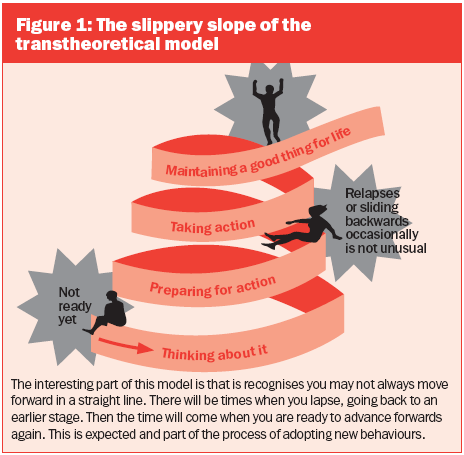 How do you go from anxious to “normal”? Well, getting your hands on good information is part of it.
How do you go from anxious to “normal”? Well, getting your hands on good information is part of it.
But you’ll need more than good information to get your life back.
There’s also a process, steps that you have to take mentally, before you can be free of abnormal anxiety.
Understanding where you’re at in that process, and how you can move forward from where you are, is just as important as any piece of information that you’ve ever, or could ever, learn about.
See, when you’re suffering from panic attacks or constant worry there’s no doubt that you want to change things for the better.
Simply wanting to stop the pain of anxiety however doesn’t mean that you’ll do what’s needed to put an end to the special kind of hell that abnormal anxiety can represent.
That’s why understanding how people change can be helpful. It allows you to take a realistic view of what you need to do to achieve meaningful change in your life instead of sitting back and hoping for the best.
So today I want to challenge you by asking a very important question: “Where are you on your journey toward recovery?” Are you ready to break free from abnormal anxiety, or are you still not sure about what’s even happening to you?
I’d like you to answer this question so that you can understand how close you are, or aren’t, to ending your relationship with abnormal anxiety. Once this is clear in your mind you’ll be surprised how much easier making decisions about treating your anxiety can become.
To help me explore this topic I’m going to use something called the transtheoretical model. This model of health behavior change explains how most people think about change and what steps are taken to achieve it.
Using a behavior change model to understand how close you are to getting better makes sense because abnormal anxiety is rooted in behavior such as reassurance seeking and avoidance.
The transtheoretical model states that there are 5 stages of change. The stages are precontemplation, contemplation, preparation, action, and maintenance. Let’s look at these one by one.
1. Precontemplation: In this stage you’re not thinking about change. In fact, while in this stage you might tell yourself that you don’t have a real problem.
For anxiety suffers in this stage there tends to be a “wait and see” attitude. This is why many anxiety sufferers in this stage are in a state of confusion that makes it difficult to know “what they have.”
Here you’ll experience some level of distress but aren’t yet thinking of ways to stop the cycle of panic or chronic worry you’re in. In that regard, you’re just rolling with it and hoping for the best.
2. Contemplation: Here you know there’s a problem and you start thinking about making a change. This is the stage of weighing pros and cons, this or that treatment, maybe yes or maybe no to doing something about your abnormal anxiety.
3. Preparation: This is the stage that I think most anxiety sufferers are in. This is where you might start looking for information, buying books, talking to people, seeing your doctor, et cetera.
Sadly, most people get stuck here. They become professional consumers of information, advice, and tricks, but tend to not use what they learn. So they’ll find something and think, “This sounds good, maybe I’ll give it a try.” Then, nothing. No follow-up.
Instead they move on to the next, “This sounds good” idea. This can go on for months, sometimes even years.
In the preparation stage you’re also likely to have a desire, maybe even a plan to change, but lack the commitment needed to reach your goals.
4. Action: This marks the point at which you want change, seek change, and do what has to be done to achieve it. Ironically, it’s also the stage where a relapse back into your old ways is most likely. This is because when you challenge your anxiety it usually gets worse before it gets better.
If that happens it’s easy to get discouraged and feel like you’re wasting your time with whatever you’re using to get rid of your abnormal anxiety. At the same time though, this is where the real work of recovery is done. This is where you make a commitment to get better and stick to it.
5. Maintenance: This is what it sounds like. You do enough to keep the gains you’ve achieved by toning down the intense use of your anti-anxiety regimen. So instead of doing breathing exercises every day, maybe you do them 2-3 times a week, for example. The point is you keep taking care of yourself.
I found a diagram to help you visualize what I’m talking about.
In my experience recovery wasn’t linear. It looked more like a zig zag pattern that brought me one step forward, then two steps sideways. That’s the nature of recovery from abnormal anxiety. My hope is that this muddy road to recovery doesn’t discourage you from trying to get better.
It can be frustrating to develop and stick to a plan, but the key is to stay focused on one important thing, which is this: Recovery from abnormal anxiety is possible.
So ask yourself where you are on this road toward change and recovery. Are you thinking about change or are you preparing for change?
Maybe you are ready for action but remain ambivalent for one reason or another. I think it’s important to clarify what you think is holding you back and what you can do about it.
Talk it out in the comments section below and tell me your thoughts on where you are and why that might be.






This trans-theoretical model is exactly what I went through during my recovery! I like to think I’m in the “Maintenance” phase of this nowadays.
And it’s certainly true: relapsing back one or two stages at some points is very common. One way I’ve found to sort of “cop-out” of that issue is to let my instincts run wild occasionally. I find that this is almost an unbiased way to test where you are at mentally. As an example, I went on three road trips this summer. Two of those road trips were random and heat-of-the-moment. I typically get antsy on my way to places which are far away, and when that happened to me, it indicated just how much I’ve grown. I didn’t have a panic attack, I just got a bit nervous.
At any rate, great article!
Thanks William, I think that is so true. Relapse is common. I just hope people don’t think that relapse means there’s no hope of getting better.
There’s always hope. There’s always options!
Hi Paul does benzo create numbness and make anxiety worst
Ha! I feel I’ve been in the Action phase for a long time, with several slides backwards. I didn’t get this way overnight, so I know that it will take time to recover. I know that I am much better now than I was at this time last year, still have a ways to go. Your statement regarding, “challenge your anxiety it usually gets worse before it gets better”, seems so true. At times I do feel the anxiety gets worse before I a take a huge leap forward.
It is a very revealing and hopefully provides an option out of anxiety, however it(to me) looks like it can tackle the problem when it has “one” cause but the causes might be many and in application only a few may be ”captured”
Good point Fredrick, but of course we gotta start somewhere right? I think so.
I think I’m on the action stage now… I just noticed, it started with my good sleep( i regain my deep sleep), I don’t think hard much now as if i wanted to make a novel (thinking of what if’s). I just wanted to wake up in the morning, thank God, kiss my daughter and send morning sms to my husband… I just wanted everything to be simple and make myself happy. I just put in my mind that things are like that, everybody has an up’s and down’s in life… life doesn’t end there.
I really hope that I can continuously overcome my anxiety. Thank u Mr. Dooley for sharing your articles. God bless.
Hi Paul, When i have thoughts about the anxiety come into mind while i am out, what would you suggest i do to retrain my thinking?
Hi Daz, Try not to think in terms of refraining. After all, many of your anxious thoughts are automatic. So, instead, you have to find a way to be OK with what you’re thinking. That is, accept that they are thoughts, which do not cause death, insanity, or deformity.
Think: This is an anxious thought, so what? Is the thought going to harm you, can it harm you? Once you take away a thoughts power, it goes away just as it entered your mind – automatically.
Setbacks happen on the road to recovery… I think the trick is not to let your anxious thinking gather momentum by being aware when you start getting pulled down that road …then treating your anxious thoughts like you would a snotty nosed kid who’s pulling faces at you !
Cheers
Frank Foster
Queensland, Australia
You know Kevin, I think that when we ask ourselves if we need help the likelihood is that we do. And there isn’t anything wrong with that. Plus, seeking professional help while you also find ways to relieve your stress is a wonderful way to ensure that all your efforts payoff.
Paul
My anxiety has been much better since starting Metoprolol. Today is the first attack I’ve had in over a month & not as strong, which I’m happy about, but it never gets easier for me. Every time I have one, it’s I’m having a heart attack or stroke & I believe this is because I have Horrible cholesterol & an Absolutely Horrible cardiac family history! I think if that wasn’t the case I could deal with all of this much easier. My previous attacks have been horrible…exactly mimics a heart attack, chest pain, nausea, burning from elbow to elbow, dizziness, rapid heart beat, teeth/left arm pain, etc. Or, it may also feel like a stroke with numbness on my right side, which I also get periodically even when I’m not having a panic attack & feel fine. I’ve felt pretty good for a while now, but now I know the fear of having another or the fear of dying will be around for a while. I HATE this!
I been going throw same anxiety thing an finding ways to overcome it I hate it I wish I be happyier again I get there we all can. Thanks
I am going through abnormal anxiety at the moment .I have had dizziness nausea feeling detached keep crying breathlessness pains everywhere feelings of going insane I have two children one of them is autistic I hate feeling like this as I don’t like my sons seeing me this way I drag myself through the day the best I can to look after my sons will I ever get out of the I also have had 20 yes with depression and have always coped with out meds but this anxiety is like living hell hope we all feel well soon Samantha 🙁
Hi Paul. I want to thank you again for showing me the transtheoretical model. It has helped me to understand my anxiety better. You are truly a God-sent. Keep up the beautiful work you are doing and as God would say, let your light shine( Matthew 5:16).
I would say that I am between the preparation phase and the action phase. Sometimes I wallow in my anxiety and then other times I diced to do something about it.
I have had a beautiful day so far.
A suggestion I would offer to you and all my brothers and sisters who are wrestling with anxiety is to focus more on giving to others and helping others when you feel anxious.
I would like to share this thought with you from God’s word:
“There is more happiness in giving than there is in receiving”.-Acts 20:35.
It feels good to help others and to show them generosity. I find that being generous helps me feel more confident when I’m feeling anxious because I feel like I was able to accomplish something despite my anxiety.
Paul, my bro, I want to say that you truly are already doing that. By you providing us with these podcasts and giving us helpful tools to recover from our anxiety, you are giving to others and helping them. You will and are experiencing the joy of giving to others.
Keep up the generosity and continue to be a beautiful and inspiring human being.
My love to you and all my brothers and sisters who are wrestling with anxiety.
Hi Sylvia. I just finished reading your post. I am happy to hear that you are in the action phase. Keep up the superb work.
When you have a set-back, don’t beat yourself up because you work hard and you should be happy about that( Ecclesiastes 3:12 and 13). Know that you have my blessing, prayers, and support.
Since you are doing so well, I would like to give you an encouraging stimulus from God’s word:
“Brothers, I do not yet consider myself as having taken hold of it; but one thing is certain: Forgetting the things behind and stretching forward to the things ahead.
I am pressing on toward the prize of the upward call of God by means of Christ Jesus”.
-Philippians 3:13 and 14.
I just want to say that you inspire me to do better and to be more serious about my recovery. Keep on working hard and doing all of the excellent work you have been doing and God will help you go places you never thought you would go(Ephesians 3:20).
Please know that I love you. Life can be hard, but don’t let anyone or anything take away your joy, hope, and recovery from abnormal anxiety. Keep on doing what you are doing and know it will pay off.
Also, take joy knowing that you are helping to inspire others, including me who are reading your post and watching you. So, don’t feel discourage. Rejoice! You have every reason to rejoice. You have worked really hard.
May God continue to bless your hard work and effort in recovery as you keep pushing forward towards the future prize in the horizon.
My love to you and all my brothers and sisters who are wrestling with anxiety❤️😘☺️🤗🙏🏼.
Hi. My name is Janessa. I struggle with an anxiety disorder myself. I want to say to all of my brothers and sisters who struggle with anxiety to maintain a waiting attitude(Micah 7:7).
Things will get better. I love you all. Keep up the fine work you are doing my bro Paul!